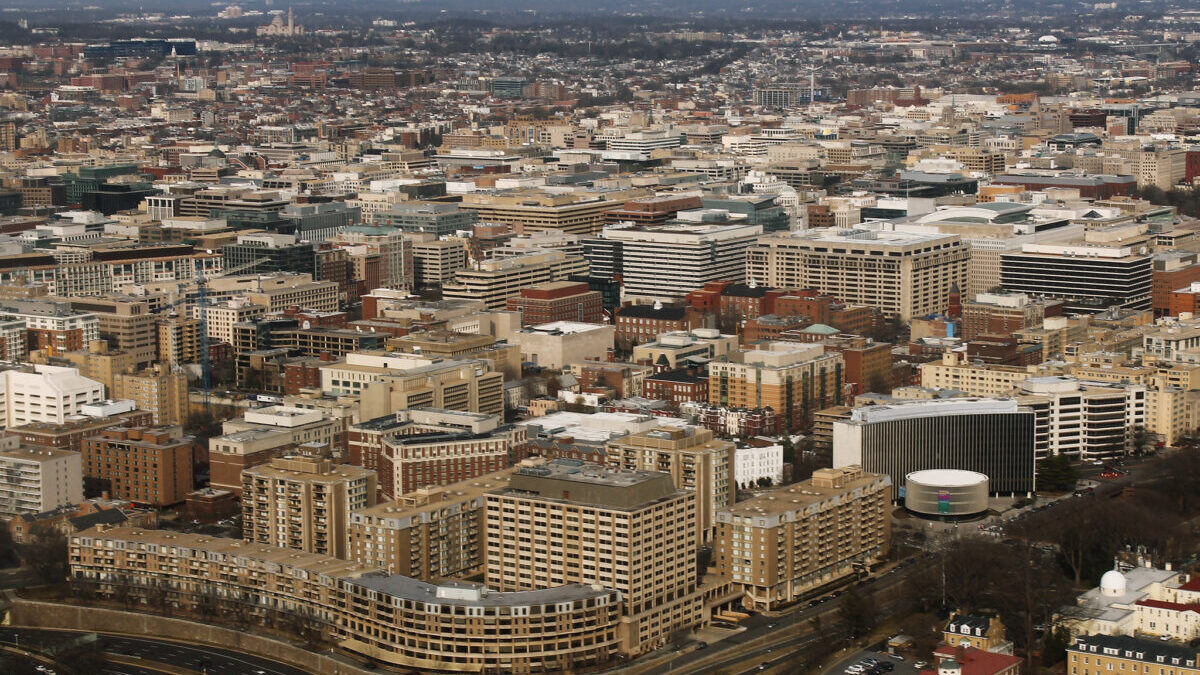If you happen to stumble onto the campus of George Washington University in Washington, D.C., you will find that Covid-19 is a greater part of our everyday lives than it is almost anywhere else in the country. The only possible exceptions to this are other college campuses — many of which have remained equally as, or more, restrictive.
While many campuses are getting back to normal, there are more than a few holdouts. At Connecticut College — which went virtual last year amid uber-restrictive Covid-19 policies — students are not only required to wear masks in all indoor settings, but also outside when they are “socializing in particularly close proximity to others.” Even in their own dorm, students must mask unless only with a roommate and the door is closed. Places such as New York University still have full mask mandates in place, while many others — such as University of Illinois and Michigan — still require them in class, but have relaxed the mandate in other situations.
GW, where I am a sophomore majoring in international affairs and economics, has decided to keep a full mask mandate in effect “until further notice,” and the university “strongly recommends the use of N95 or KN95 masks.” This means masks are required in every class, every dorm hall (even in individual rooms when socializing with people one does not live with), and every school building, with no exceptions. At the beginning of the semester, the people in charge of my dorm building sent an email warning students that a failure to wear a mask — even if one was eating or drinking — would result in being reported to the school.
On top of this mask mandate, on-campus students are required to take part in GW’s “asymptomatic surveillance testing” program. In practice, this means that they are required to take a Covid-19 test approximately every week and a half, even if they are completely asymptomatic. If one misses the deadline, his access to nearly every university building (except for their dorm hall) is removed until he gets the test.
GW’s Approach Is Illogical
These Covid-19 measures are in place despite a few important factors. First, young people (i.e., the population of GW) are at, by far, the lowest risk to become severely ill or die from Covid-19. Second, all students at GW have been required to provide proof to the school that they are vaccinated and boosted. If the near-100 percent natural protection from being young was not enough, the fact that all students are thrice-vaxxed surely means Covid-19 poses, in practical terms, no threat to them.
Moreover, GW can no longer use DC’s law — nor the CDC’s guidance — to justify their policy. After all, the mask mandate in DC is now gone and the CDC only recommends masks in “high-risk” areas — a classification that does not apply to DC. In fact, DC falls into the “low risk” category, which means that people should “Wear a mask based on your personal preference, informed by your personal level of risk.” The last time DC had a seven-day average of over 100 cases per day was back in February, and GW has a positivity rate hovering around 1.0 percent.
So why is GW treating fully vaccinated and boosted college-aged students — in a city with minimal Covid-19 transmission — as if we are the most vulnerable population to Covid-19 when, in fact, we are the least vulnerable?
GW Can’t Justify Masking
On March 21, I emailed the university president, GW’s dean of health affairs, and GW’s dean of students, asking why they thought GW’s restrictive Covid-19 measures remained necessary. I hoped to get insight and clarity that the university’s previous public statements had not provided.
As of today, I have received only one reply. The email came from a representative of GW’s Division for Student Affairs, and he declined to answer my question. Instead, the representative directed me to GW’s Office of Media Relations. Upon further inquiry with the Office of Media Relations, I was, first, directed to the university’s previous statements and, second, informed that GW has not changed its Covid-19 restrictions because of “our recent spring break and the rise of the BA.2 variant [a subvariant of Omicron].”
To put it bluntly: this is not sufficient justification. This is not only the case because the benefits of Covid-19 restrictions have shown themselves to be negligible (see this CDC study that found “required mask use among students was not statistically significant compared with schools where mask use was optional” and this recent meta-analysis from Johns Hopkins University, which found that “lockdowns have had little to no effect on Covid-19 mortality”), but also because it appears that GW’s Covid-19 strategy is built on an indefensible premise: namely, that restrictions cannot cease until the virus is eradicated.
Covid-19 Will Never Go Away
But most sober-minded people understand that, at this point, it is impossible to get rid of Covid-19. No matter how many restrictions are put in place — and no matter how authoritarian they are — the virus will still be here.
This is particularly true on college campuses, where students will party, go to clubs, and socialize at bars no matter what the university’s policy about masks in class is. Therefore, with this reality in mind, it is up to all of us to decide how to best live with the virus. Because Covid-19 effectively poses zero risk to students, living with it on college campuses should not include top-down imposition of ineffective, draconian restrictions. Rather, it would be best to create a campus atmosphere that is not centered around Covid-19.
Moving forward, if an individual would like to be particularly stringent about Covid-19 prevention, that is certainly his prerogative. If students want to always wear a mask, regularly take at-home tests, and refrain from eating around other people for fear of catching Covid-19, that is okay. Every person has different risk assessments, but, at this moment, the most stringent risk assessments are being imposed on everyone — and that is not okay.
Both the country in general and Washington, D.C., in particular, are getting back to normal. It is past time for GW to do the same.









